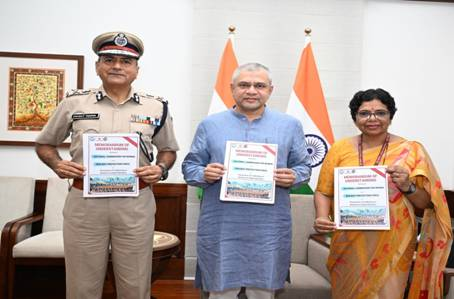RPF and NCW Renew Pact to Combat Human Trafficking via Indian Railways
Speaking at the event, Smt. Vijaya Rahatkar, Chairperson of NCW, called human trafficking one of the gravest human rights violations, disproportionately affecting women and girls.

- Country:
- India
In a resolute step towards intensifying the battle against human trafficking, the Railway Protection Force (RPF) and the National Commission for Women (NCW) renewed their Memorandum of Understanding (MoU) on the occasion of World Day Against Trafficking in Persons. The event was marked by the presence of Union Minister for Railways, Shri Ashwini Vaishnaw, symbolizing the government’s robust commitment to safeguarding women and children across India's vast railway network.
The renewed agreement aims to empower RPF personnel with the skills and tools required to prevent human trafficking and crimes against women, enhancing one of the country’s most widespread public service systems—the Indian Railways—into a key pillar in the national anti-trafficking framework.
MoU Signing and Booklet Launch: A Symbolic Step
The MoU was formally signed between Smt. Shivani Dey, Deputy Secretary, NCW, and Shri S. Sudhakar, DIG/Projects, RPF. In conjunction with the signing, a special anti-human trafficking booklet, developed by NCW, was unveiled to support education and sensitization efforts across railway staff and public audiences.
Sharing the development on social media, Shri Ashwini Vaishnaw remarked, “This partnership reinforces our commitment to protect the most vulnerable through an integrated and proactive response. Railways, given their reach and daily footfall, are uniquely positioned to serve as the first line of defence against trafficking.”
Human Trafficking: A National Crisis
Speaking at the event, Smt. Vijaya Rahatkar, Chairperson of NCW, called human trafficking one of the gravest human rights violations, disproportionately affecting women and girls. She stressed the urgency of early detection and praised the RPF’s consistent efforts in tracing and rescuing trafficked individuals.
Highlighting achievements, Rahatkar noted that the RPF has rescued over 65,000 trafficked and lost/runaway children in the past four and a half years, showcasing the force’s pivotal role in frontline interventions across thousands of railway stations and trains nationwide.
Director General RPF: Indian Railways as a Guardian Force
Shri Manoj Yadava, Director General of RPF, underscored the transformative potential of this partnership. “The Indian Railways, given its reach, has the dual responsibility of ensuring safe travel and protecting vulnerable lives. Our collaboration with NCW will not only enhance training but also strengthen surveillance and community engagement,” he said.
With lakhs of passengers using the railway system daily, it becomes a critical transit route that traffickers often exploit. Hence, the RPF’s role as a watchful guardian becomes more important than ever.
Operational Impact: From Training to Immediate Response
The MoU outlines a multi-pronged approach to tackling human trafficking through:
-
Structured Training Programs and Sensitization Workshops: RPF personnel will undergo capacity-building programs designed by NCW, covering legal frameworks, victim support, psychological aspects, and detection techniques.
-
Public Awareness Campaigns: Informational materials will be circulated through railway stations, trains, digital screens, and pamphlets in multiple languages to educate passengers about trafficking indicators and reporting mechanisms.
-
Strengthening Anti-Human Trafficking Units (AHTUs): With over 750 AHTUs already operational across the country, the MoU aims to improve their efficiency and integrate technological tools such as real-time surveillance, facial recognition, and rapid-response protocols.
-
Community Engagement and Support Networks: The collaboration also focuses on involving civil society groups, local NGOs, and helplines to form a wider safety net for at-risk individuals, especially women and children in distress.
A Nationally Coordinated Fight Against Trafficking
This MoU reflects the broader national approach to zero tolerance toward human trafficking, supported by inter-agency coordination, victim rehabilitation strategies, and international cooperation. India’s legislative framework, which includes laws like the Immoral Traffic (Prevention) Act, Juvenile Justice Act, and provisions under the IPC, is being actively operationalized through enforcement bodies like the RPF.
Additionally, the Indian Railways is implementing advanced digital monitoring systems, AI-based passenger profiling, and CCTV analytics, which, when combined with trained personnel, creates a layered defence against trafficking networks.
Looking Ahead: From Protocol to Protection
As both RPF and NCW continue to collaborate, the renewed MoU not only consolidates past achievements but also charts a forward-looking roadmap for preventing trafficking through India's transport lifelines. With continued focus on capacity building, technological integration, and public awareness, this partnership aspires to make the railways not just a means of transit, but a safe space for every woman and child.
The message from this initiative is clear: India is committed to eradicating trafficking in all its forms, and its most trusted institutions are stepping up with renewed energy and strategic alignment.










